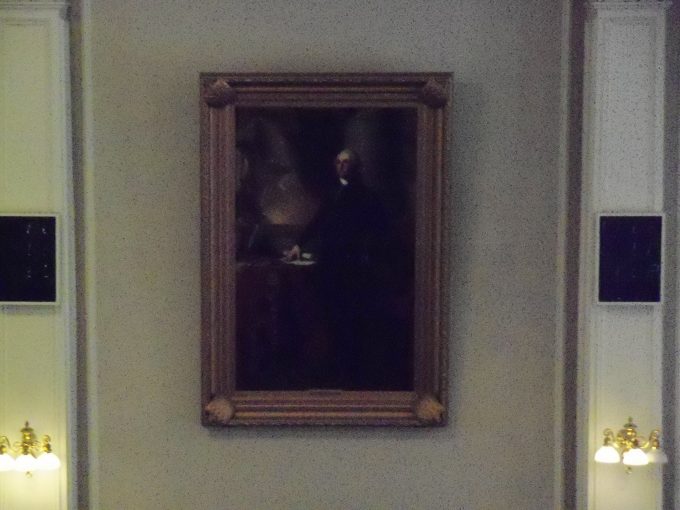
Monday, 18 March 2019
By faith Jacob, when he was dying, blessed each of the sons of Joseph, and worshiped, leaning on the top of his staff. Hebrews 11:21
The author now turns from Isaac to Isaac’s own son of promise, Jacob by stating, “By faith Jacob.” The author then looks to two defining moments in the life of the man. The life of Jacob spans Genesis 25-49, and it was a life which filled the pages of Scripture with countless exciting details. And yet, once again, the author focuses first on the act of blessing his progeny.
When Jacob was very old and sick, Joseph came to his bedside with his own two sons, Manasseh and Ephraim. With Joseph at his side, and while dying, Jacob “blessed each of the sons of Joseph.” The account, found in Genesis 48, records very specific wording and actions in order to make a point about redemptive history. Jacob knowingly placed the younger son, Ephraim, above the elder, Manasseh. He did this understanding that Ephraim would grow to become, as he said, “a multitude of nations.”
Like his father, he spoke the blessing with the surety that it would come to pass, exactly as spoken; and thus, this most significant act is recorded here in Hebrews. Along with that, a second moment of faith is also recorded about his life. It is that he “worshiped, leaning on the top of his staff.”
This actually occurred prior to the blessing of Ephraim and Manasseh, in Genesis 47:31. The reason for having the two accounts chronologically backward is probably to first tie the blessing by Isaac of the previous verse in Hebrews in with the blessing by Jacob here. With that connection made, it then goes back in time to Genesis 47. The words here in Hebrews are a direct quote of the Greek translation of the Old Testament. The Hebrew reads, “So Israel bowed himself on the head of the bed.”
The difference between the Hebrew word for “bed,” which is mittah, and “staff,” which is matteh, is only a few vowel points which didn’t exist when the Bible was written. They were added later to help in pronunciation, word clarity, and comprehension.
The Greek is surely what is correct here. When the Hebrew scribes who inserted the vowel points did so, they probably indicated “bed” rather than “staff” to keep Jacob from looking as if he were using the staff as an idol. But if he were an old and feeble man, he would worship leaning on his staff simply to stay up. Either way, what is implied is that Jacob was thanking and praising God for what had occurred in the previous verses of that passage which concerned Joseph’s vow to Jacob to have his body interred in Canaan rather than Egypt. But more specifically, he asked to be buried in the burial place of his fathers which is a specific cave bought by Abraham.
The purchase of that cave is recorded in Genesis 23. Instead of being buried with his beloved Rachel, he asked to be buried there instead. It was a significant spot which looked forward to the resurrection of the righteous. It is to this location that he asked for his remains to be interred.
Thus, he is noted – in both of these instances – for faithfully looking forward to the promises of God and the growth of God’s people, far into the future. Such acts are demonstrations of great faith.
Life application: As has been seen several times already, the doctrine of divine election is noted in this verse. Jacob’s blessing on Ephraim was a movement of the Holy Spirit which again directs the reader to an important truth in God’s redemptive plan for all of mankind. Jacob said that Ephraim would become melo ha’goyim or, literally, “a fullness of the Gentiles.” Understanding this passage led Paul to write his analysis of the Jewish/Gentile situation as is recorded in Romans 9-11. By God’s foreknowledge, Israel would reject their Messiah which would open the door to the Gentile-led church age. Ephraim, used as a synonym for the fullness of the Gentiles, would come to Christ through faith in His glorious work. In Romans 9:25, 26, Paul quotes the prophet Hosea to help us understand this mystery –
“I will call them My people, who were not My people,
And her beloved, who was not beloved.”
26 “And it shall come to pass in the place where it was said to them,
‘You are not My people,’
There they shall be called sons of the living God.”
If you struggle with the thought of your salvation, for whatever reason, understand that it was something that God had known would occur all along. The fact that Jacob’s blessing, which occurred thousands of years ago, would point to the Gentiles being brought into His redemptive plans shows that God knew and purposed that you would be a part of His salvation found in Christ. Instead of fretting over your state of salvation, be grateful for it, and know that because of God in Christ, you are made acceptable to our heavenly Father.
O Lord! Although Your word can often seem difficult to grasp, one thing is easy to understand – faith in Jesus equates to eternal salvation. Because of Your great love for the people of the world, You have given us the right to be called sons of the living God. All we can do in response is to shout praises to our mighty Lord! Amen.
